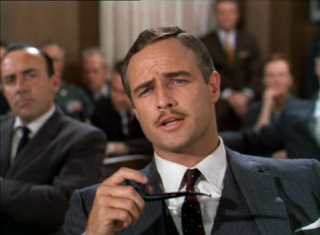"The only thing that is clear is that there's no clarity at all."
The Ugly American (1962) is an earnest but tin-eared drama. Director George Englund boils Eugene Burdick and William Lederer's critical novel into a position paper for Cold War liberalism. Marlon Brando's strong performance ballasts an otherwise crude, confused time capsule.Harrison MacWhite (Marlon Brando) becomes Ambassador to the Asian nation of Sarkhan. Finding the country riven by political turmoil, he reaches out to opposition leader Deong (Eiji Okata), his old friend. But Deong's agitation for increasing independence leads MacWhite to brand him a Communist. This misunderstanding leads to a clash over Freedom Road, a construction project which becomes a symbol of American imperialism. Rejected by his erstwhile friend, Deong finds foreign Communists all too willing to help.
Shot partially in Thailand, The Ugly American is very much of its time. Kwen Sai (Kukrit Pamroj), Sarkhan's nepotistic, corrupt Prime Minister, evokes Ngo Dinh Diem, while MacWhite faces down rioters like Richard Nixon in Caracas. Having just escaped nuclear war over Cuba, America turned its attention to Vietnam, where Diem's regime tottered under domestic pressure; the CIA applied the death knell, necessitating military intervention. Like many a '60s liberal, Ugly American is queasily equivocal about projecting American power.
Englund and screenwriter Stewart Stern try to unravel Cold War complexities. When Deong attacks "Yankee imperialism," MacWhite decides he's a Communist and provokes a showdown. Deong is an earnest nationalist who criticizes American self-interest, but he's manipulated by real Communists. The real hero is Homer Atkins (Pat Hingle), a do-gooder engineer whose wife (Jocelyn Brando) runs a hospital. Their humanitarian efforts, not soldiers and propping up dictators, are the real way to win "hearts and minds."
When Ugly American's message isn't obvious, it's garbled. Kwen Sai goes from tin pot dictator to earnest reformer in a few scenes, while MacWhite's indiscretions are lost amidst a barrage of Communist atrocities. Despite its cynicism, American falls back on Red-baiting malapropisms. In an unintentionally hilarious scene, Deong joins a Commintern meeting with squirrelly Soviets, Mao-jacketed Chinese and local commies in a jungle tent! Strangely, there's no equivalent scene of MacWhite consulting corporation heads and CIA operatives.
Marlon Brando sells the drama through a strong performance. He's fairly restrained, mixing humor with eccentric touches like singing to a turtle. Yet Brando's friendly swagger gives way to stark forcefulness, making didactic debates about foreign policy almost interesting. Controlled, focused, and obviously invested in the message, Brando holds the film together.
While the American cast is undistinguished, the Asian stars offer some interest. Japanese star Eiji Okada (Hiroshima, Mon Amour) gets his only American role; despite his halting English, his anguished charisma makes a nice counterpoint to Brando. Kukrit Pamroj makes Kwen Sai a silky, ingratiating schemer too clever to be an American puppet. A politician himself, Pamroj later became Prime Minister of Thailand.
The Ugly American is an artifact of New Frontier idealism: America defeating Communism through good deals and friendly gestures. It's a nice fantasy that overlooks sordid reality; here, only the Reds conspire and undermine governments, Americans just make mistakes. American manages to be cynical and naïve, down to the chicken-scarfing loser watching MacWhite speak on television.


